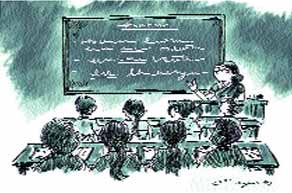Craving for quality education: Role of teachers

BABU RAM NEUPANE
Quality education is perhaps the most debated issue in current academic discourses and professional circles. A recently concluded international conference on ‘quality in classroom’ in Kathmandu culminated in a Kathmandu declaration reiterating the significance of adoption of epochal pedagogical practices toward achieving quality in the classroom. Quality education eludes us unless a force of well-qualified teachers is developed as they play an unassailable role in facilitating the learning processes in the classroom. Therefore, it is necessary to address the grievances of the teachers to achieve any educational reform. Moreover, the integration of inclusion and relevance perspectives can only be materialized through the proactive support of the teachers.
The teachers can work wonders in motivating the students by presenting themselves as the unparalled role models through letting students see and hear their interest and motivation, communicating their expectations that students would enjoy learning, along with picking up on the idea that learning is a pleasant activity, not a competitive or high pressure one. According to educationist Richard Arends, teachers can capitalize on the students’ innate motivation to learn by stressing the value of the task by pointing out how knowledge and skills can bring pleasure and satisfaction, personalize by expressing their beliefs, attitudes, or own experiences that illustrate the task’s importance, be enthusiastic by stating their liking for this type of work, and state positive expectations by telling students they know the latter will enjoy the task and do well. Well-trained and competent teachers are astute observers of the school environment and do systematic inquiries and come to conclusions. They internalize the essence of active student engagement which lies at the heart of meaningful learning and effective teaching. They are fully aware of learning being a complex and quite an amazing phenomenon that involves a wide array of cognitive and affective processes. Learning is also a reorganization of prior ideas, a process wherein the learner must tap into memory and recall ideas and information that are related to the new learning. Efficient teachers use new examples, make active comparisons with old ideas and make judgments about the similarities and differences of the new ideas with the old.
A teacher is one of the important means of inculcation of values in the students. S/he is the only person in the world whose mental dispositions and socio-cultural orientations are closely observed during the regular hours of teaching and beyond school premises and they have far-reaching influences in the making of a good person out of the students.
Some educationists have also reinvented the pyramid of learning by placing the students at the top as resource, and placing the teachers in the middle as the catalysts and placing the community at the bottom as foundation. This is intended to optimise learning by making it more interesting, and more creative. But this model requires adequate resources such as well-stacked libraries with adequate reference materials, access to internet facilities, adequate teaching learning materials and professional satiety and motivation among the teachers who are well trained for its effective implementation and success. In the absence of institutionalization of periodic teacher performance evaluation, lack of positive and negative sanctions it proves just yet another hype and hoopla in the contexts of developing and underdeveloped countries where the governments struggle to provide for one set of textbooks to their students.
An effective teacher is one whose students learn with fun. It is needless to say the teacher is more important than family background or environment, and classroom resources or even technology. A teacher awakens his students from their indifference to the right and wrong and nerves their energies to seek for the truth and live up to it at whatever cost. Teachers who update themselves regularly can handle the classroom efficiently. Sadly, only a limited number of teachers show any eagerness to update themselves with the latest innovations, teaching methodologies and rational thinking apart from being empathetic and having eagerness to support the students through thick and thin. Teachers can easily exalt their notions and conceive a degree of knowledge. It is the noble teachers that make the noble students; rather than conversely. Nowhere was the deep almost exclusive faith people used to have in teachers more visible than in the institutions before political interventions shredded it into pieces. But sadly, most of prevalent teacher-student relationships are marked with hostility due to mistrust and disrespect to each other. The situation can be reversed through establishment of mutual respect and bilateral understanding.
Teaching is equivalent to touching the future of the students. Capacitating and motivating teachers toward touching hearts and minds of their students is tantamount to salvaging a lost generation in time. The ongoing debates are bound to enthuse the teachers to take up responsibilities of holding aloft the torch of civilization and reinstating the lost glory and rescripting Gurukul-era reverence from the pupils.
source: Neupane, Babu Ram (2013),"Craving for quality education: Role of teachers", The Himalayan times, 20 May 2013
The writer is associated with Aide et Action Nepal
photo/art: The Himalayan Times
Posted on: 2013-05-21





























